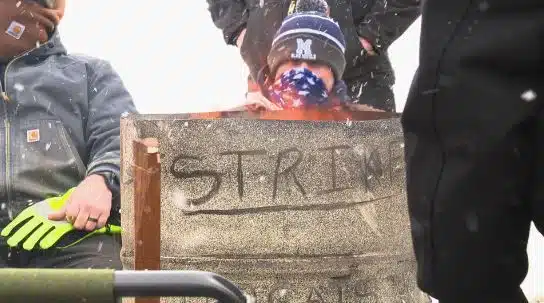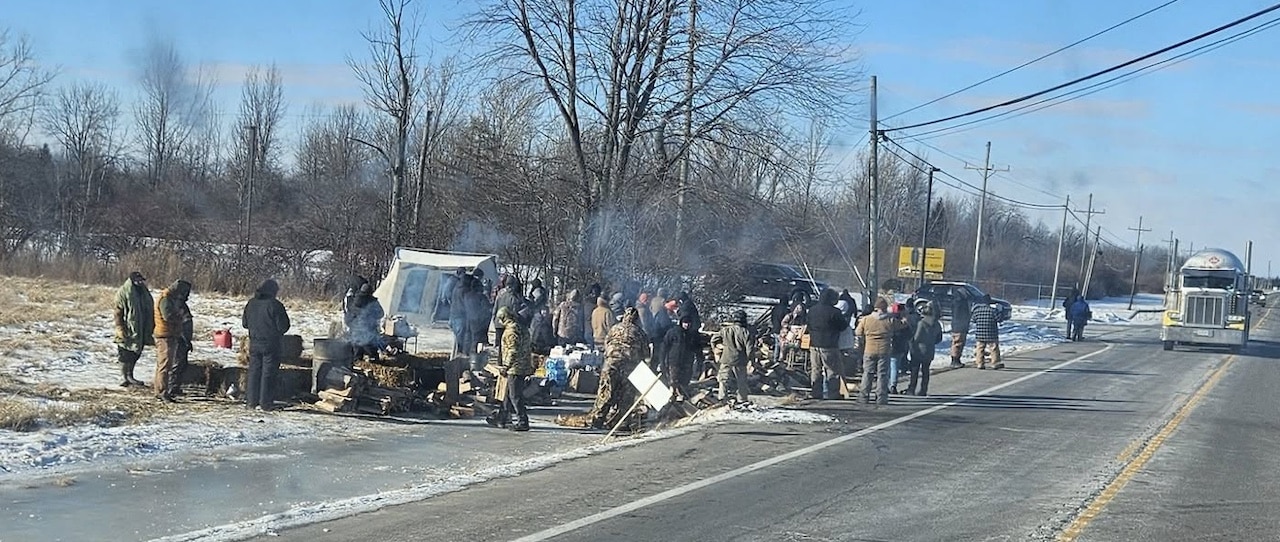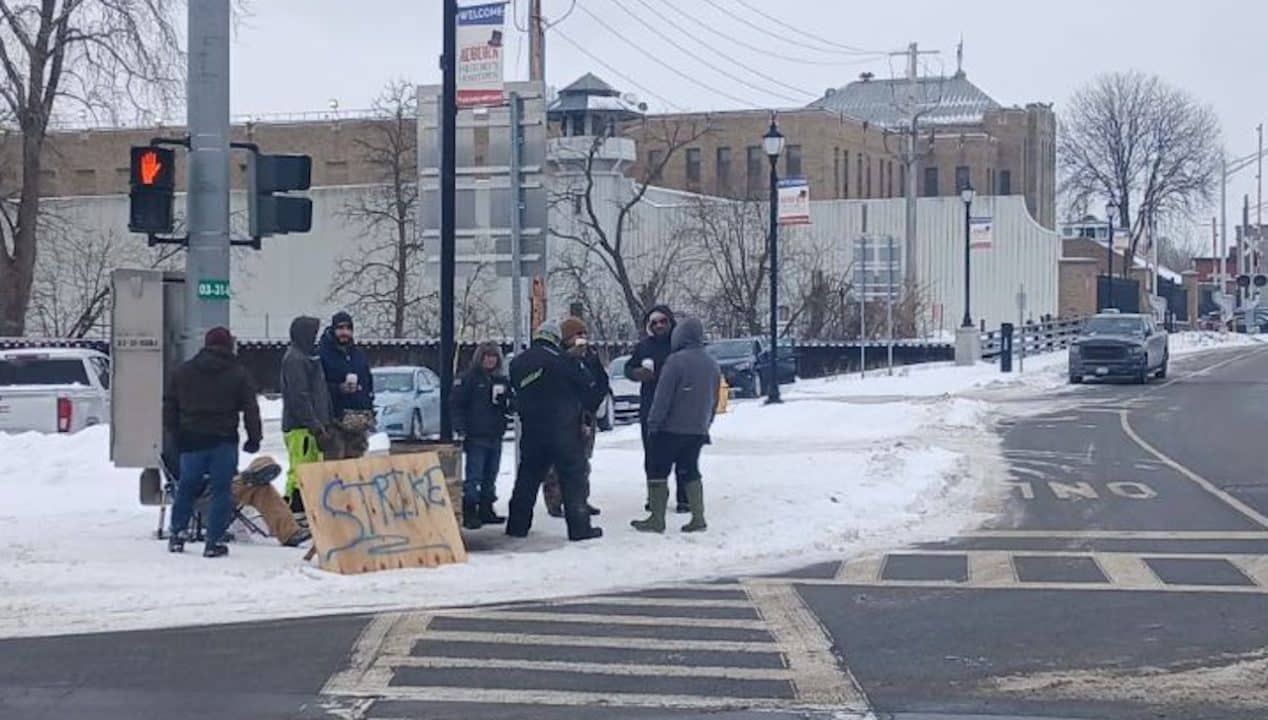As New York correction officers continue their strike, state lawmakers remain split over prison staffing reforms and the controversial HALT Act, which limits solitary confinement. While some legislators signal willingness to address staffing and retirement concerns, deep divisions persist on whether to repeal or amend HALT.
Republican leaders, including Senate Minority Leader Rob Ortt, have urged Gov. Kathy Hochul to reconsider the law, arguing it hampers prison security. Meanwhile, Assemblymember Anna Kelles has advocated for expanding earned time credits instead, focusing on reducing incarceration rather than increasing solitary confinement. Despite the divide, lawmakers from both parties agree that pension reforms—such as extending Tier 3 benefits to Tier 5 and 6 employees—should be prioritized to improve recruitment and retention of correction officers.
As staffing shortages worsen, Hochul has activated the National Guard and pushed mediation efforts to quell the crisis. However, legislators stress that real reform requires the governor’s leadership in shaping the budget.
Despite demands from striking officers, Assembly Correction Chair Erik Dilan firmly stated there is no legislative support to alter HALT. He remains adamant that the law, which restricts solitary confinement practices, will stand.
The debate comes amid heightened scrutiny of prison conditions following the December death of incarcerated man Robert Brooks, allegedly at the hands of prison staff. His case has intensified calls for staff accountability, with pending arrests expected to add further tension to the ongoing labor dispute.
Senate Corrections Chair Julia Salazar defended Hochul’s decision to deploy the National Guard, calling striking officers “rogue” and emphasizing that outside intervention was necessary to maintain order. While staffing reforms may be considered in the upcoming budget, Dilan and other lawmakers signaled that major changes favoring correction officers remain unlikely.
Judge bars correction officers from striking as National Guard deployed

A state judge granted New York’s request to prohibit correction officers from striking under the Taylor Law, following mounting protests across upstate prisons. The National Guard was deployed to Attica Correctional Facility as Gov. Kathy Hochul condemned the strikes, citing safety risks.
Prison guards demand better working conditions, but state officials claim their actions are illegal. Meanwhile, negotiations have begun between union leaders and state officials. The union is pushing for improved staffing, wage increases, and penalty-free returns for those who walked off the job.
State Police are assisting with security at affected facilities. While discussions continue, correction officials accuse officers of engaging in an “illegal job action.”
HALT Act at center of correction officer strike
The strike centers around the HALT Act, which restricts solitary confinement. Enacted in 2022, the law prohibits solitary for certain groups, including individuals over 55, under 21, and those with disabilities. Officers argue this removes consequences for misconduct, contributing to rising prison violence.
Supporters, including former inmates, say solitary confinement is harmful and alternatives reduce violence. However, state data shows inmate assaults on staff have increased since HALT took effect, surpassing 2,000 incidents in 2024. Repealing the law requires legislative action, though some call for emergency suspension.
Striking officers also demand increased staffing, body scans for visitors, stricter mail screening, hiring bonuses, and limits on mandatory overtime. Governor Kathy Hochul has mobilized the National Guard to maintain security at affected prisons.
National Guard deployed to Auburn as COs strike
As Auburn Correctional Facility officers joined a statewide strike earlier, Gov. Kathy Hochul mobilized the National Guard to maintain prison security. Hundreds of officers picketed, citing unsafe conditions, staffing shortages, and rising contraband issues.
The state’s Department of Corrections and Community Supervision (DOCCS) condemned the strike as illegal and suspended visitation at multiple prisons. Hochul warned officers to return to work, stating that law changes must go through legislation. Meanwhile, the National Guard’s arrival underscored the state’s resolve to maintain order.
With tensions high, Auburn officers remain defiant, demanding changes in staffing policies and safety measures. However, state officials insist reforms must follow legal channels, leaving the standoff unresolved.
CO’s strike enters third day at Finger Lakes prisons
Protests are continuing for a third day at prisons across the Finger Lakes and New York State. They’re striking over conditions inside prisons that they say are not safe for workers or inmates.
We’ll bring more on this developing story as the day continues.
Mounting frustration over conditions at prisons across NY prompt wildcat strikes: Latest from around FLX
Correction officers across New York are striking, saying their frustration with unsafe conditions and lack of support has reached a breaking point. They blame the HALT Act for stripping their authority, leading to a surge in inmate violence, with over 2,000 staff assaults reported in 2024—nearly double from 2020.

Many officers feel abandoned by lawmakers and are quitting in frustration. Retired lieutenant Vinny Blasio says officers believe they have “nothing else to lose” as assaults rise and consequences disappear.
With no clear changes to HALT on the horizon, officers say they are fed up and demand action to restore order and safety in prisons.
Hochul prepares to deploy National Guard to end correction officers’ strike
Governor Kathy Hochul announced plans on Tuesday to mobilize the New York National Guard to staff state correctional facilities if an ongoing work stoppage by correction officers does not end by tomorrow. The strike, which state officials have deemed unlawful, has raised serious public safety concerns, prompting Hochul’s intervention.

Hochul directed Department of Corrections and Community Supervision (DOCCS) Commissioner Daniel Martuscello to meet with the leadership of the New York State Correctional Officers & Police Benevolent Association (NYSCOPBA) in an effort to resolve the dispute. However, she made it clear that if the strike continues, the state will take immediate action to restore order.
“The illegal and unlawful actions being taken by a number of correction officers must end immediately,” Hochul said. “We will not allow these individuals to jeopardize the safety of their colleagues, incarcerated people, and the residents of communities surrounding our correctional facilities.”

In addition to deploying National Guard personnel, Hochul has instructed her legal team to work with the Attorney General’s office to enforce the Taylor Law, which prohibits public employees from striking. The Governor also warned of disciplinary actions against those participating in the work stoppage.
Martuscello emphasized the importance of maintaining safety within correctional facilities. “This illegal job action involving NYSCOPBA members is causing irreparable harm to the operations of the department and jeopardizing the safety and security of their co-workers within these facilities,” he said, urging officers to return to work.
The work stoppage comes despite significant concessions made by the state in recent years to improve working conditions for correction officers. In 2024, the state reached a collective bargaining agreement with NYSCOPBA that increased salaries, hazardous duty pay, and parental leave benefits. Additionally, the Hochul administration has taken measures to improve facility security, including introducing body scanners to prevent contraband smuggling and expanding recruitment efforts to address staffing shortages.
Recruitment initiatives have included multi-channel advertising campaigns, career fair participation, and incentives for new officers. DOCCS has also introduced hiring initiatives targeting specific regions with critical vacancies, including Auburn, Elmira, and Clinton correctional facilities.

Despite these efforts, staffing shortages remain a persistent challenge, and Hochul’s administration has been working to expand hiring efforts further. However, with the current strike disrupting operations, state officials say immediate action is needed to ensure safety in New York’s prisons.
With the National Guard on standby, Hochul is making it clear that the state will not allow the work stoppage to continue unchecked. The outcome of the ongoing discussions between the state and NYSCOPBA will determine whether the Governor’s emergency measures will be enacted.
Corrections officers at Finger Lakes prisons join work stoppage, protesting for policy reforms
Corrections officers at Cayuga Correctional Facility in Moravia have joined the work stoppage protests that began at Elmira and Collins facilities, escalating a movement calling for prison policy reforms. As of this morning, officers stationed outside the Moravia facility set up a protest across the street, demanding action on safety, staffing, and discipline policies.
The work stoppages, though widespread, are not officially sanctioned by the New York State Correctional Officers & Police Benevolent Association (NYSCOPBA), the union representing corrections officers. Similar protests have been reported at other prisons around the Finger Lakes and Central New York, including Auburn Correctional Facility and Five Points Correctional Facility.
At the core of the officers’ grievances is the HALT Act, which restricts the use of solitary confinement and limits disciplinary measures against incarcerated individuals. Since its implementation in March 2022, corrections officers argue that violent assaults on both staff and incarcerated individuals have surged, even as the overall state prison population has declined. According to a recent report from the Department of Corrections and Community Supervision (DOCCS), assaults on staff have risen from 1,043 in 2019 to nearly 2,000 in 2024.
Officers are also protesting a new 70% staffing reduction policy introduced in a February memo by DOCCS Commissioner Daniel F. Martuscello III. They argue that the cutbacks have exacerbated safety concerns by leaving facilities understaffed and overburdened.
Additional demands include stricter policies to prevent contraband, such as drugs and drug-related items, from entering correctional facilities. Officers are also calling for an end to third-party vendor programs, which they claim pose security risks. Another major concern is the involuntary overtime policy, which has been a source of frustration for corrections staff required to work beyond their scheduled shifts.
Protesters are also demanding assurances that they will not face disciplinary actions or pay reductions for participating in the work stoppage. Under the Taylor Law, public employees who strike can be penalized with two days’ pay deducted for every day they participate in the protest.
The work stoppages have drawn attention to ongoing tensions between prison staff and state corrections officials. While state authorities have defended recent policy changes as necessary reforms, corrections officers insist that current conditions make their jobs increasingly dangerous.
With no resolution in sight, the protest movement shows no signs of slowing down. Officers at multiple facilities across the state continue to press for changes, raising the stakes for state corrections leadership in the weeks ahead.



